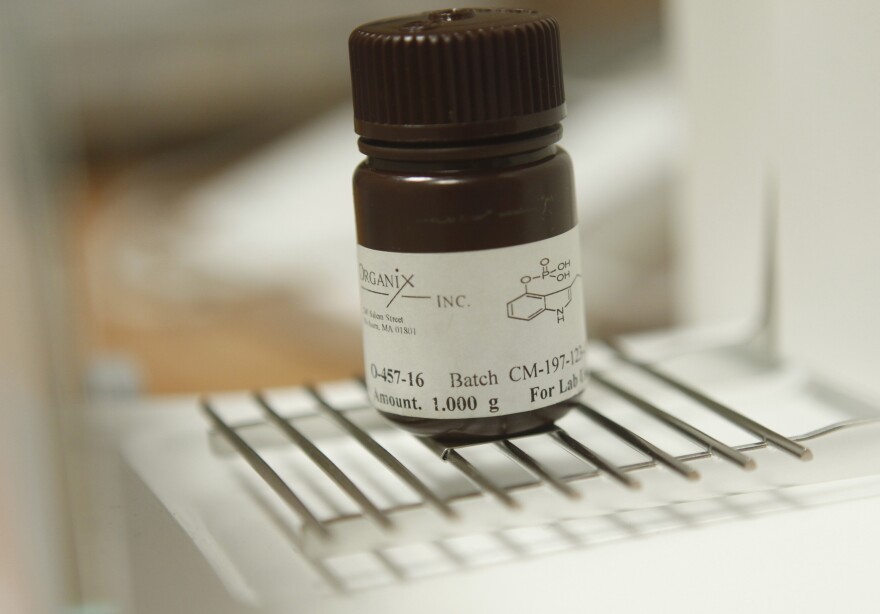With our free press under threat and federal funding for public media gone, your support matters more than ever. Help keep the LAist newsroom strong, become a monthly member or increase your support today.
Psychedelic Science: Researchers enlist Psilocybin to help fight alcoholism

This is Part Two of our Psychedelic Science series. Click here for Part One, here for Part Three, and here for Part Four.
It may seem counterintuitive to treat addiction with a drug that the Drug Enforcement Agency (DEA) classifies as one that carries a high risk of addiction. But psilocybin — the naturally-occurring drug found in "magic mushrooms" — is showing promise in the treatment of alcoholism and other addictions, say researchers, who have conducted scientific studies with the hallucinogen.
"The stronger the person's subjective response to psilocybin and the more they reported dimensions of mystical quality to the experience, the greater their clinical improvement in terms of both their drinking and their psychological status," says Dr. Michael P. Bogenschutz, professor and vice-chair for Addiction Psychiatry and Clinical Research at the University of New Mexico who recently completed a pilot study that used psilocybin-assisted psychotherapy.
While psilocybin-assisted psychotherapy to treat addiction is in its early stages, Bogenschutz says the use of hallucinogens — specifically LSD — to treat alcoholism is not.
"There were many studies and considerable clinical use of LSD in the treatment of alcoholism dating to the mid-1950s," he says.
In fact, Bill Wilson, the co-founder of Alcoholics Anonymous (AA), reportedly embraced medically supervised LSD as a way to achieve the spiritual awareness considered key to the 12-step addiction recovery program.
RELATED: CDC fact sheet on alcohol and health
Bogenschutz says his now-complete study that used psilocybin to help treat alcohol dependency suggests the drug may show some of the same promise as LSD. He says while its effects varied widely among participants — with some patients drinking less and some quitting all together — overall, their symptoms showed improvement.
Among those who quit drinking entirely was Sarah, whose last name was not released in order to protect her privacy. In an interview taped 10 months after her participation in the study, she describes heavy nightly drinking that she says created an emotional distance between her and her two young sons and which robbed her of her happiness.
After taking the psilocybin, her experience "was painful, a deep pain that I hadn’t felt, and pure joy on the other hand," says Sarah. "And between the two, [it] brought me to a place of peace and understanding."
Bogenschutz said his study was inspired by a number of controlled trials from the 1960s that researchers recently examined and analyzed together.
"This meta-analysis revealed a consistent effect across the six studies in favor of the group receiving LSD treatments," Bogenschutz says, adding that the findings show LSD to be even slightly more effective than today's three legally-approved drugs for treating alcohol dependency.
That finding has sparked renewed interest in studying hallucinogens to treat alcoholism, smoking and drug addiction. This time around, however, psilocybin is the favored drug used in US studies. While it works in much the same way as LSD, psilocybin doesn't carry the same stigma. And because its shorter acting than LSD, psilocybin is a better candidate for outpatient treatment, researchers say.
RELATED: National Institute on Alcohol Abuse and Alcoholism fact sheet on alcohol use disorders
Another advantage of hallucinogenics hold over the legally approved drugs now available to treat alcoholism is that patients don't require repeated doses or long-term prescriptions, says Dr. Stephen Ross, director of the alcohol and drug abuse program at Bellevue Hospital Center in New York City.
"These are unusual models in that it’s not like you take a pill every day for months or a year," said Ross, who also leads psychedelics research at NYU Medical School.
"You take a pill, you have an experience. The experience is powerful and insightful and rich," he added.
Other types of hallucinogens are now being studied outside the U.S. In Mexico and New Zealand, scientists have been researching Ibogaine — from the root of a West African shrub — to treat addiction to narcotic pain killers. In British Columbia, researchers have completed a study of Ayahuasca — the ancient Amazonian plant brew to treat drug addiction.
None of these drugs offers a cure per se, says Ross. Instead, he says, they seem to act as a catalyst that can make traditional addiction therapy more effective.
"Somebody can have an amazing transcendental experience and they can have insight that 'I should never use drugs again.' But if there is nothing afterwards to contain and embed and nurture those experiences, it will just fade," he says.
Another benefit of hallucinogens is that they are not physically addictive as is alcohol, nicotine or cocaine. Still, experts warn that caution is necessary, as these drugs are powerful substances that can be misused.







